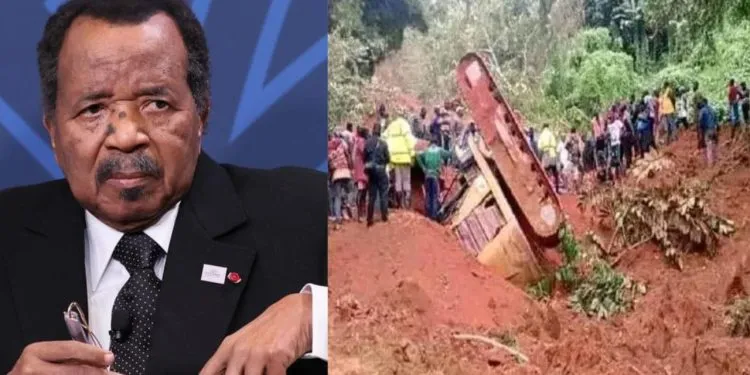President Paul Biya is yet to show any public empathy towards victims of a landslide that killed 12 and injured several people in Dschang, West Region, last week.
Amid this landslide, which has garnered national sympathy, President Biya does not seem to care, one week since the disaster occurred.
He has not issued a word to console the victims and the bereaved families.
His silence on the issue has attracted questions from Cameroonians and opposition leaders like Prof Maurice Kamto, President of the Cameroon Renaissance Movement party.
At a press conference organised last Saturday, November 9, Kamto chastised the government for showing very minimal concern for the victims.
“But where is the President of the Republic, Head of State, and Chief of the Armed Forces, Paul Biya? Since his return to the country, he has been able to receive diplomats, but why has he not said a word or issued a statement several days after the tragedy? The silence of the Head of State in the face of the tragedy where dozens of his compatriots have been buried for days is unacceptable,” Kamto denounced.
During his 42 years in power, Paul Biya has generally been a silent President, ruling Cameroon primarily through Presidential decrees.
However, he has often condoled with victims of past disasters, for example the recent floods in the Far North Region, where at least three members of government visited the site.
But the Dschang landslide has received very little response from the government, and President Biya hasn’t commented about it one week after.
Charity Abroad
A day after the landslide occurred, Biya wrote a congratulations message to newly elected US President, Donald Trump.
He also announced the creation of a Cameroonian consulate in one part of China.
His lack of empathy towards landslide victims has left many Cameroonians wondering whether the 91-year-old is even aware of daily realities in the country.
“President Paul Biya You have certainly learned what happened in Dschang. All that concerns you right now is the presidential election in the United States of America,” Dilane Tayo, a Facebook user.
Brice Nkem Moucheu, another Facebook user, said: “We await your exit on the landslide at the cliff of Dschang Mr President.”
Collins Kamga questioned: “Excellency Mr. President of the Republic of Cameroon, have you learned that compatriots were buried yesterday at the cliff of Dschang by the earth following a double landslide?”
Minister Using Biya’s Name
Biya’s silence towards Dschang landslide victims contradicts his reaction towards past disasters.
When floods devastated thousands of homes in the country’s Far North in August and September this year, the President did not only extend condolences to victims, but doled out a relief package costing over FCFA 1 billion.
The Minister of Territorial Administration, Paul Atanga Nji, carried some food stuffs to the affected areas on Paul Biya’s instructions.
His reaction towards the Dschang Cliff disaster has been silence, a stark contrast.
He has neither announced humanitarian assistance nor expressed sympathy towards victims.
Dschang, where the landslide occurred, is located in the West Region, the region of President Biya’s fiercest opposition figure, Maurice Kamto.
Normalized Silence
Paul Biya has been in power for 42 years and has normalised silence, though his supporters claim is his way of talking.
But could it be that he does not even know that such a thing is happening?
Government’s Slow Response
Rescue operations have been going on at the landslide site for the past one week, with government excavators and volunteers digging through the rubble in search of buried victims.
Several people are still believed to be missing. But the excavations have been slow and laborious.
Several families have also been camping at the disaster site waiting for bodies of their missing loved ones.
No government aid has yet reached them as they camp in temporary shelters day and night.
Prime Minister, Joseph Dion Ngute, offered condolences on X, but did not say what the government was doing to help the situation.
Victims might be unable to pay medical bills, reclaim damaged properties, or even have a stable life again.



